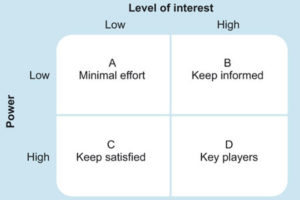When it comes to living our passions, running our projects and exploring our many interests, in general we are only thinking about ourselves; Why we want to do this, what we want to get out of it, when we want it, and how to get where we want to be. And I guess this is a natural reflex, selfish creatures that we are!

But unless your name is Robinson Crusoe, you and your passion or project are not isolated from the rest of the world. In fact, depending on the size and the type of your passion or project, there can be many other people involved.
In general we become aware of this when someone is not happy with what we are doing and is trying to block us. Big alarm bells are ringing at that moment. It’s better to be aware of who will be involved or impacted by your interest, passion, project or program and to know if they will be supporting or blocking you before all the alarm bells go off.
Who are the people involved in your passion or project?
In general there are always more people involved or impacted by your passion or project than you would expect at first sight. It’s also a given that the bigger the size of your project or program, the more people are involved and impacted.

In general, there are a few generic groups of people: People who are part of your passion or project:
You can call them your team members, contributors, supporters or fans. These are the people who are helping you to achieve your objective. They are part of your ‘team’.
- People who are paying you:
You can call them clients, customers, sponsors, advertisers or if your career is your project, your employer or your boss. But it can also be your partner, your parents or any other relative or friend in the role of a ‘sponsor’. - People that you are paying to get any goods, material or services:
You can call them suppliers or providers and even some intermediaries can have this role, like your bank, insurance broker etc. - People on which your passion or project has an impact:
In the first place, this can be your family, relatives and friends but depending on your project, it can be a very large group of people. - Legal instances:
Depending on the kind of project, you will also have to cope with legal instances.
If more people than just yourself are involved in your passion, project or programme, then it’s good to know who they are.
What is their power and what is their interest in your project?
It’s never possible to keep everyone satisfied. But when the stakes are high and people have a high interest in your passion, project or programme, then it’s like walking on egg shells. It can help to create a Power / Interest matrix and see in which cell different people belong.

This is a simple matrix. The question is: Who belongs in which cell and how to handle each group of people.
- High power, high interest
These people are very important for the success of your passion or project. They can make or break your project, so you need to keep them closely involved in every step and every activity. You will also often need their permission and approval.
People who are paying you absolutely belong in this cell. Hopefully you also have some of your ‘team members’ in this cell.
If you are paying the people in this cell or your project has a high impact on people in this cell, then you find yourself in a rather weak position. - High power, low interest
These people are also important and they are able to block your project if they have a good reason for it. So the point is to keep them informed and satisfied.
It is a good thing if they are a part of your passion or project ‘team’, so you can count on their support.Legal instances also belong in this cell. In general they don’t care about your personal project. All they care about is that you follow their rules.
The same is the case for providers when they have a high demand for their products or services or in case they have a monopoly. - Low power, high interest
These people don’t have the power to block your passion or project but as they have a high interest, the least you can do is to keep them informed.
Most of your ‘team’ members will find themselves in this cell of the matrix. The challenge is to keep them motivated. If you do a good job, they will become your raving fans and support you all that they can. And many of them together can make a powerful group.
Again, some providers can be in this cell, especially when they’re in a very competitive market.
And people whose life will be highly impacted by your passion or project, definitely need to be kept informed. - Low power, low interest
These people don’t care about your passion or project and they don’t have the power to help you forward or to block you. The only thing to do for you, is to keep them on your radar and from time to time to look if some of them haven’t moved to one of the other cells in the matrix.
As I said, you can never keep everyone happy, but now that you know about this matrix, you can choose who you want to keep happy so your passion or project has more chance to succeed, which probably in return will make you happy.
What’s the level of engagement of the people involved?
Now that you know how important different groups of people are for the success of your passion or project, let’s look at their level of engagement.

- Unaware:
They don’t know about your passion, project or programme. This should only be the case of people with low power and no interest. - Resistant:
They are aware but they are resistant to change. If they have high power and a high interest, they will block you for sure. - Neutral:
They are aware of your passion or project but they are neither supportive nor resistant. In fact, they don’t care. Probably they are found in the cells of the matrix where the level of interest is low. - Supportive:
They are well aware and they are supporting your passion or project. If it’s not yet the case, get them aboard and make them a member of your team! And if they’re not in your team, this is your customer base. - Leading:
They are not only very aware of your passion, project or programme but they are actively engaged in making the project a success. These are your raving fans. These are the ambassadors of your ‘brand’. These are the people who spread your word. Hallelujah!
It’s a must to have those who are powerful and having a high interest in your team.
As customers, they are your fans, and as such they will buy anything from you.
This is not an exercise just to put a label on people. The objective is to increase your chances of success by being aware of the people that are involved in your passion, project or programme.
Communication is key and your communication must be adapted to suit the different groups of people: What you communicate, how you communicate and how often, depends on all the above.
Your view?
